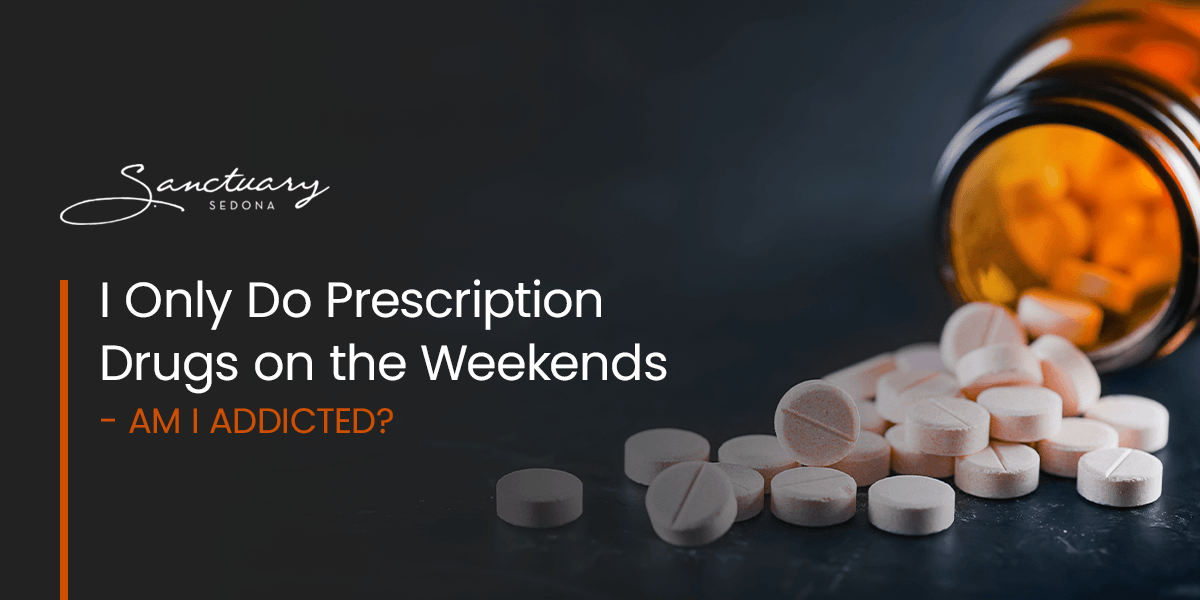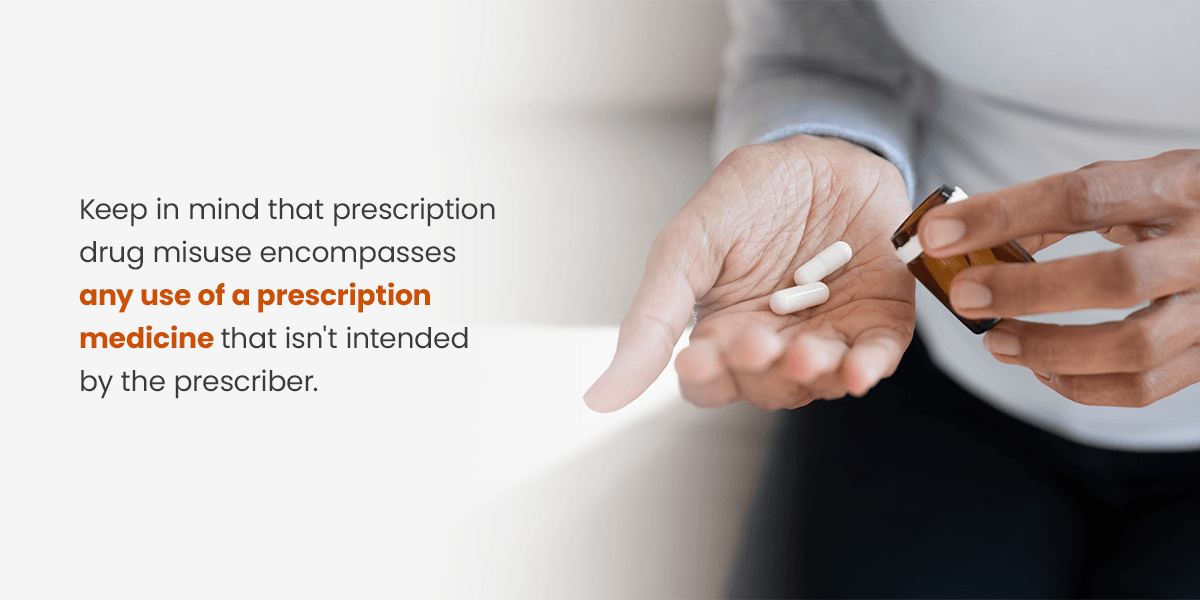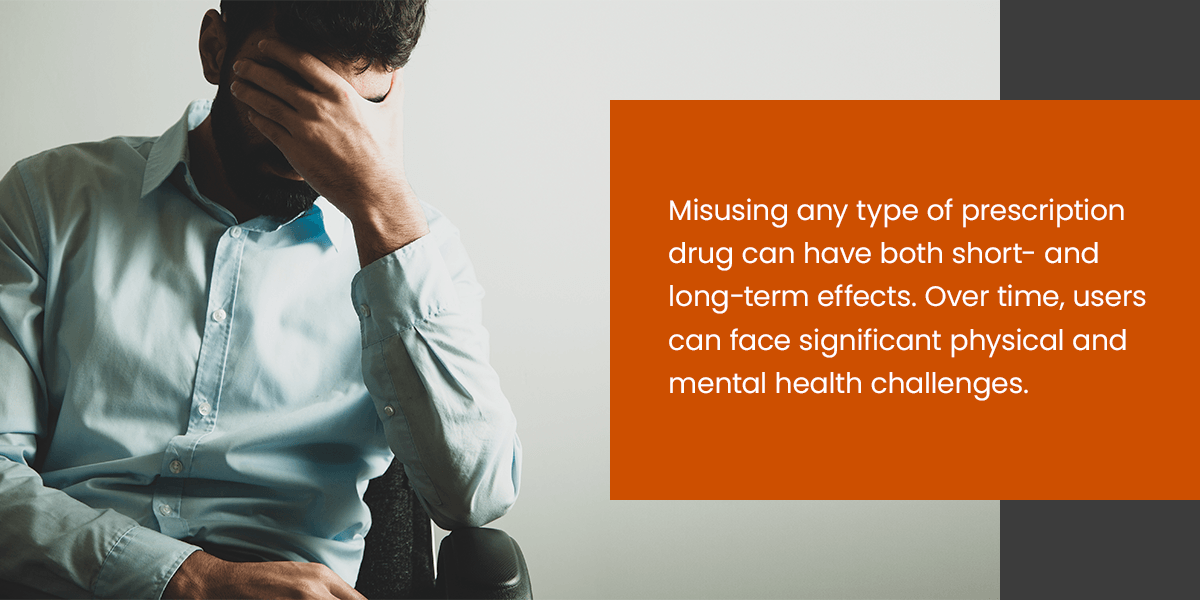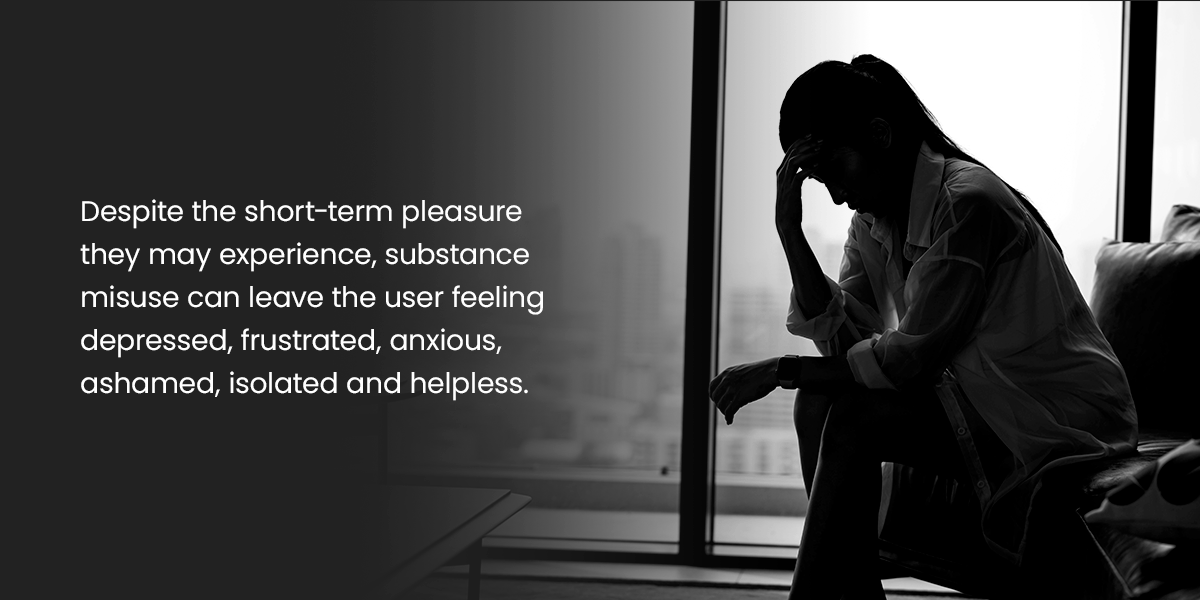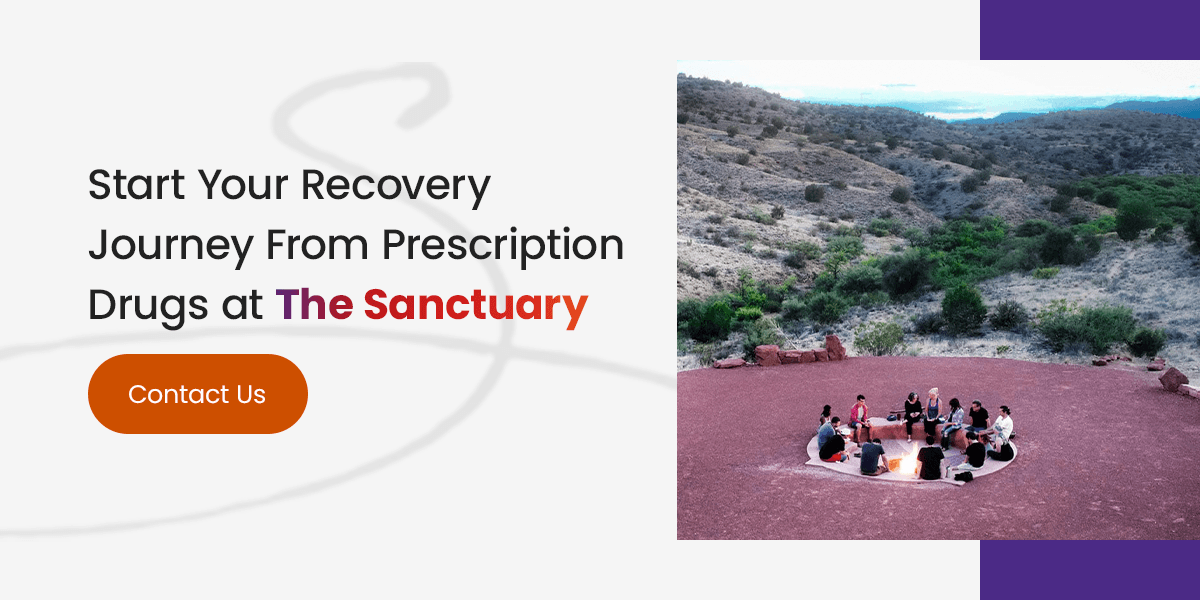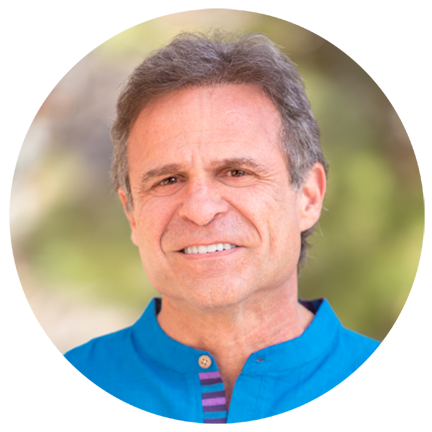Prescription drug misuse and addiction are prevalent issues facing our nation. Studies show that 52 million Americans over the age of 12 have deliberately misused prescription medications at least once in their life, with painkillers and opioids being the most common types.
If you struggle with a prescription painkiller addiction — even if you’re only using it on weekends — getting help and treatment is vital for your health and well-being. Read on to learn about some commonly misused prescription drugs, their symptoms and long-term effects and how you can treat your addiction.
Am I Addicted to Prescription Drugs if I Only Use Them on Weekends?
Similar to drinking alcohol or using another addictive substance, only using prescription drugs occasionally or on weekends doesn’t always indicate an addiction. However, it can signify or lead to addiction or misuse in some cases.
Keep in mind that prescription drug misuse encompasses any use of a prescription medicine that isn’t intended by the prescriber. Therefore, whether you have an addiction ultimately comes down to how you’re using the drug. If you’re taking it as instructed by the provider and aren’t experiencing any severe withdrawal symptoms, you likely aren’t addicted.
On the other hand, you’re misusing prescription drugs if:
- You’re taking someone else’s prescribed medication, regardless if it’s for a legitimate medical purpose or to experience euphoria.
- You’re taking your prescription drug in a manner or dose other than prescribed.
- You’re taking your prescription drug for a purpose other than intended by the prescriber, such as a high or euphoric sensation.
These behaviors often result in addiction. If you’re only using prescription drugs on weekends but you’re still misusing them in some way — such as taking larger doses than prescribed, snorting ground-up pills or taking a friend’s prescription painkiller for your own pain — you likely have an addiction. It’s important to seek help if you think you’re misusing or addicted to prescription drugs.
Commonly Misused Prescription Drugs
There are various categories of prescription drugs, each affecting users differently by slowing or speeding up body functions. Below are some frequently misused prescription medications, along with their symptoms, effects and dangers to be aware of.
1. Depressants
Doctors prescribe Central Nervous System (CNS) depressants like sedatives, hypnotics and tranquilizers to manage conditions like sleep and anxiety disorders. They help soothe the individual by relaxing the muscles and slowing normal brain activity, causing a drowsy, uncoordinated feeling.
Large doses can complicate breathing, memory, concentration, balance and speech. Some examples of prescription depressants and anti-anxiety medications include:
- Alprazolam (Xanax)
- Diazepam (Valium)
- Pentobarbital sodium (Nembutal)
- Zolpidem (Ambien)
2. Opioids
Prescription opioids are used for treating moderate-to-severe pain, typically after an injury or surgery or for health conditions like cancer. Some effects of opioid use include respiratory depression, drowsiness, confusion and feeling high.
Common types of prescription opioid painkillers are:
- Codeine
- Hydrocodone (Lortab, Vicodin)
- Oxycodone (OxyContin)
- Meperidine (Demerol)
- Morphine (Avinza, Kadian)
3. Stimulants
Doctors prescribe stimulants to treat conditions like attention-deficit hyperactivity disorder (ADHD) and sleep disorders such as narcolepsy. They help increase energy, alertness and focus.
Some common effects include feeling high and elevated heart rate, blood pressure and body temperature. Large doses can lead to dangerously high body temperature and an abnormal heartbeat that can cause cardiac arrest. Some examples of prescription stimulants are:
- Amphetamine/dextroamphetamine (Adderall)
- Dextroamphetamine (Dexedrine)
- Lisdexamfetamine (Vyvanse)
- Methylphenidate (Concerta, Ritalin)
The Long-Term Effects of Prescription Drugs
Misusing any type of prescription drug can have both short- and long-term effects. Over time, users can face significant physical and mental health challenges. They can also experience issues in multiple aspects of their personal lives, such as jobs, money and relationships with loved ones.
Below are some potential long-term effects that can come with prolonged prescription drug misuse.
1. Organ Damage or Failure
Prescription drug misuse can affect all of the body’s organ systems. It can lead to impaired coordination, breathing and muscle movement. It can also cause chronic heart conditions and digestive system ulcers. Furthermore, it can damage the reproductive system and disrupt hormone regulation.
Intravenous substance users have a higher risk of protein buildup in tissues and organs, which is associated with chronic inflammation and infection, or secondary amyloidosis. This infection can progress to kidney failure. Opiate overdose can cause rhabdomyolysis, a condition that occurs when muscle tissue releases electrolytes and protein into the blood. Rhabdomyolysis can increase the risk of kidney and heart damage.
2. Mental Health Disorders
Prolonged prescription drug misuse can cause long-term effects on the brain, which may lead to chronic mental health problems like depression, anxiety, impulse control disorders, paranoia and hallucinations.
Drug misuse often coincides with mental health disorders. In some cases, conditions like schizophrenia, anxiety and depression may precede addiction. In other cases, substance misuse can trigger or aggravate these mental health disorders.
3. Malnourishment
Loss of appetite is a common effect of drug misuse. Over time, a poor appetite can lead to malnourishment and unhealthy weight loss.
4. Bloodborne Illness
Those who inject prescription painkillers into the bloodstream increase their risk of contracting bloodborne illnesses like hepatitis C and human immunodeficiency virus (HIV), as with any injectable drug.
5. Cognitive Decline
Many prescription drugs can impact cognitive function by attaching to receptors, which control how the brain interprets, receives and delivers signals. When the drugs attach to the receptors, they prevent neurotransmitters from attaching to receptors. This can reduce cognitive function, highly complicating daily activities.
6. Psychological Addiction
When a user becomes addicted to prescription drugs, their mind fixates on the constant cycle of cravings and rewards. As a result, they develop a psychological dependence that grows harder to break the longer they continue using the substance.
7. Personal Problems
On top of physical, mental and cognitive effects, prescription medication misuse can take an emotional toll on multiple areas of your life, including careers, finances, relationships and reputation. Those struggling with drug misuse may find it can take years to heal broken wounds, repair relationships and rebuild their lives when recovering from addiction.
8. Risk of Overdose
The body develops a tolerance to the drug’s effects after regular use. That means users must continue increasing the dosage to feel the effects. This unhealthy cycle causes dependency, increasing the risk of overdose.
Why Prescription Drug Use Can Become More Frequent Than You Planned
Prescription painkiller use often becomes more frequent than intended due to its addictive effects. It only takes one time for the ecstasy to pull a user in, and from there, they’re likely to crave more of it and use the substance again and again. Many individuals view this sensation as an escape from negative emotions and life problems, so they often turn to substance use as a coping mechanism.
This repetitive use can quickly spiral into addiction. Prescription drug addiction can develop rapidly, making it difficult to recognize and treat right away. Even if you’re only using prescription painkillers occasionally or on weekends, it’s easy to become dependent on the drug, leading to more frequent use and addiction.
It’s essential to recognize the signs of drug misuse and addiction in yourself and others — that way, you can seek proper treatment as soon as possible.
The Cycle of Prescription Drug Addiction
How does a prescription drug addiction develop? Below are the typical steps in the substance addiction cycle.
1. Curiosity
There’s usually an initial factor that sparks the user’s curiosity, drawing them toward the drug. For instance, maybe they heard an interesting story from a friend using a prescription drug, or that friend persuaded them to try theirs. Perhaps they noticed a euphoric sensation after taking their own prescribed drug for the first time. Curiosity is the first step in the prescription drug addiction cycle.
2. Experimentation
When curiosity overcomes an individual, they start to experiment with the substance. For example, they may grind up the prescription drug to snort, inject or mix into a drink.
Their brain chemical receptors produce euphoria, as the prescription drug activates its reward center. Many prescription drug effects resemble those of cocaine, as they can cause high levels of feel-good chemicals like dopamine, norepinephrine and serotonin.
This brain chemical reaction can cause adverse effects like dizziness, lightheadedness, irregular heartbeat and blurred vision, which is often enough to push people away after the first try. Unfortunately, this temporary high intrigues many other users and leaves them wanting more, resulting in many cases of addiction.
3. Regular Use
When the user enjoys the temporary exhilaration and escapism, they usually give it another try. From there, they start to use it again and again to experience that same effect.
Before they know it, they’re using the substance consistently. As long as the drug is available and accessible to them, they’ll continue finding time and excuses to use it, often without considering the consequences.
4. Dependence
After a period of regular use, such as a few days or weeks, the body and mind become so dependent on the substance that they can’t function without it. The brain comes to expect the chemical reaction in the neurotransmitters to the point where it shuts down without the drug. This extreme dependence is the final step of the addiction cycle.
Eventually, the user fears being without the substance, and their use and addiction develop further. While the effects can vary by the type of substance, they can experience intense withdrawal symptoms like:
- Muscle aches and pains
- Intense substance cravings
- Fever
- Dilated pupils
- Insomnia
- Fatigue
- Sweating
- Nausea and vomiting
- Anxiety and depression
- Frustration, irritability and agitation
- Seizures
- Appetite changes
- Trembling and tremors
This compulsive drug-seeking and inability to function without the substance indicates addiction is in full swing.
Signs of Prescription Drug Addiction
Frequent prescription drug misuse can negatively affect the user’s feelings, behaviors and relationships. It can also cause problems in work or academic performance.
Despite the short-term pleasure they may experience, substance misuse can leave the user feeling depressed, frustrated, anxious, ashamed, isolated and helpless. Recognizing the signs of prescription drug addiction in yourself or a loved one is an imperative first step to getting help.
1. Physical Signs
Some physical warning signs of drug addiction and misuse include:
- Abnormally small or large pupils
- Bloodshot eyes
- Decreased blood pressure
- Heavy sweating
- Constipation
- Dry or itchy skin
- Changes in sleep patterns, appetite or physical appearance
- Strange smells on the body, clothing or breath
2. Behavioral Signs
One might exhibit these behavioral changes when becoming addicted to prescription drugs:
- Isolating from friends, family and social activities
- Borrowing or stealing someone else’s prescribed painkillers
- Forging prescriptions
- Breaking or crushing pills
- Visiting multiple doctors to obtain prescription medications
- Displaying signs of financial distress, such as frequently borrowing money or selling their belongings
- Lying about their whereabouts and activities or engaging in suspicious behaviors
- Displaying poor performance and attendance at school or work
- Showing sudden changes in hobbies, friends or favorite hangouts
- Using prescription drugs to reduce uncomfortable or negative emotions
- Stashing medication around the house
- Lying about the amount of medication used
- Getting into legal trouble, like arrests for driving under the influence or disorderly conduct
3. Psychological Signs
Some psychological warning signs of prescription painkiller addiction include:
- Depression
- Anxiety
- Irritability
- Paranoia
- Drastic mood changes
- Unexplained change in attitude or personality
- Abrupt mood swings or angry outbursts
4. Cognitive Signs
A person can experience these cognitive symptoms of prescription drug misuse as their brain changes and adapts to the substance:
- Impaired coordination, balance and focus
- Confusion or disorientation
- Poor judgment and decision-making skills
- Slurred speech
- Impaired memory and learning
The Dangers of High-Functioning Prescription Drug Addiction
A person with a high-functioning addiction lives a seemingly normal life — such as holding down a stable job, spending time with their loved ones and maintaining proper hygiene — but privately struggles with the effects of substance use.
The danger of high-functioning prescription drug addiction is that it’s hard to recognize. The user doesn’t show the typical signs of addiction, so those around them often don’t realize they’re dealing with a substance issue. Therefore, the user may go longer durations before getting the help they need.
Additionally, high-functioning addiction can make it easier for the user to justify their substance use. They may convince themselves they don’t have a problem since it doesn’t disrupt their daily activities, but in reality, it can still weigh heavily on their physical and mental health.
Whether you have a high-functioning prescription drug addiction or are outwardly displaying warning signs, getting proper treatment is crucial for your health and well-being.
Start Your Recovery Journey From Prescription Drugs at The Sanctuary
If you’re seeking prescription drug addiction treatment for yourself or a loved one, help is never far away. The Sanctuary at Sedona offers a non-12-step, integrative approach to help people overcome prescription drug addiction. Our holistic treatment plans are designed to address the whole person, meeting their unique needs in a safe environment with attentive staff.
Incorporating methods like talk therapy and psychiatry, yoga and meditation, breathwork, nutrition programs and more, we aim to help you:
- Uncover the root cause of your addiction.
- Rediscover yourself and your life’s purpose.
- Address unresolved traumas in your body, mind, soul and spirit.
- Learn new techniques for understanding your thoughts and behaviors.
Let us help you take your next steps in breaking free of your addiction once and for all. If you’d like to learn more about our holistic treatment services or begin your healing journey, fill out our contact form or call 877-710-3385 today.
He is the Founder, Administrator, Counselor at the Sanctuary at Sedona. He has a BA in Political Science and is currently Senior teaching staff at Four Winds Society, an international school of energy medicine. His credentials also include being an Ordained Minister; a Certified Shamanic Breathwork® Facilitator; a Founding Member Society for Shamanic Practitioners; a Member of Association for Comprehensive Energy Psychology; a Member of the National Institute for Holistic Addiction Studies. [email protected]

